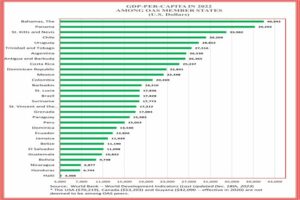
By Dr Everson W. Hull
There is a great deal for the people of the Federation of St Kitts and Nevis to celebrate. Recent World Bank data shows that there are only three of the 34 OAS Member States — Guyana, The Bahamas and Panama — which have outperformed St Kitts and Nevis in providing for the welfare of the masses. In pursuit of a unified Caribbean region, a few observers have lobbied for setting aside the small states. A review of the fundamental determinants of economic growth and, in turn, prosperity is instructive in shedding light on how a few very small states have outperformed their peers and emerged near the head of the regional performance class.
To illustrate, until Guyana arrived in 2022, the Commonwealth of The Bahamas proudly occupied the number one seat at the head of the regional class. The Bahamas has a comparative advantage that results from its close proximity to the US. It outperforms others in the volume of activity for tourism, international banking, and capital investment. Setting aside Canada and the USA which, at the polar extreme, are deemed not to be peers of the Latin American and Caribbean group, no other sovereign state in the Western Hemisphere has earned a higher ordinal ranking than The Bahamas. This pride of post was disrupted in 2022 by Guyana which for the first time earned a per capita income of US $42,090, muscling out The Bahamas which earned US $40,943.
By contrast, Panama has recently moved to the number three ranking position with its doubling of the capacity of the Panama Canal, allowing an increase in the flow of larger ships. St Kitts and Nevis occupies the number four position because of its sale of an opportunity to participate in its Citizenship by Investment program.
Although a visible show of unity among member states is important, the pursuit of prosperity demands a much wider focus than the unity lobbyists have allowed. The focus on the individual, and his or her ability to perform at an optimal performance level, with commensurate recognition and rewards, is of paramount importance in any fair appraisal of the success or failure of a member state in achieving its highest productive potential. A sequence of high-level unity meetings in high-priced regional resorts that fully ignore the performance of the individual, and his or her choices in the pursuit of leisure over work, will continue to produce the sub-par declining performance levels that have been harmful to the region over the past 30 years.
It was Adam Smith (1723-1790) who first drew attention to the determinants of the Wealth of Nations. The four Fundamental Factors of Production that he drew attention to are as relevant today as they were 250 years ago. These factors are land, labor, capital, and entrepreneurial ability. Today, these fundamental inputs of production processes have been greatly improved by the broad array of technological innovations that have enhanced the efficiency and, in turn, the productivity of labor and capital.
The failure of the unity lobbyists to recognize the significance of these factors as the driving force behind the growth and prosperity of member states and, in particular, small states is deeply troubling. Country size is not a sufficient basis for setting aside small states and, in- turn, embracing large states which have not performed well in recognizing the several technological innovations that are being deployed in the global marketplace. The pursuit of prosperity will not occur without access to a skilled and motivated labor force, and a cadre of capital investors who are willing to incur a measure of human capital risk in funding projects under consideration.
It was Nobel Laureate, Robert Merton Solow (1924-2023) who gave special attention to the development of econometric models which focused on the empirical significance of technology in enhancing productive efficiency and higher rates of productivity if countries are going to approach the blissful state of full productive potential.
Regrettably, there has been no discussion among the small island unity opponents of the significance of information technology in building on the four fundamental factors of production. Nor has there been any show of appreciation for countries which have been successful in recognizing the importance of competition and compensation structures aimed at motivating the workforce to aggressively push for improved efficiency and higher rates of productivity.
More meetings calling for setting aside the existence of small countries do not seem to recognize that small island states have a duty and obligation to meet the needs of their citizen workforce and the land mass that embodies their reach. Their pursuit of prosperity must be aimed first at meeting the needs of the masses within their own geographic boundaries. Their year-end individual and national mission objectives are published in their year-end budgets and jointly shared with the International Monetary Fund (IMF) and the World Bank, which focus on the development needs of their member states. That a country has met its size constraints is an achievement to be celebrated and not threatened and deemed worthless by big island states which, far too often, have failed to meet their own mission objectives.
St Kitts and Nevis has been successful in the design and promotion of an organizational structure that offers a safe haven and opportunity for investors, who are well-endowed with substantive income and wealth. Notwithstanding, it has not earned a sufficient basis for resting on its laurels. Every effort should be directed at designing structures that are competitive providing motivation for each employee to be the very best that he or she can be in a mastery of the technology that would produce “HIGHLY VALUED” products, destined for global markets in which there is an excess demand.

Data provided by the Economic Commission of Latin America and the Caribbean (CELAC) shows a sharp decline in Labor Productivity growth in the region over the 29-year interval from 1991 to 2020. There is no compelling reason in today’s technology-driven age why regional productivity has been declining throughout Latin America and the Caribbean; while productivity in the USA has been increasing at a rapid pace.
There is much that can be derived by observing the entrenched practices of the USA which has a requirement that makes it mandatory for each publicly traded company to file a Form 10-K annual business disclosure report with the Securities and Exchange Commission (SEC). There is a great deal that OAS member states can learn from the structural design of the readily available SEC access-free compensation reports. In its simplest form, the USA compensation structure has three major components that seek to motivate each employee to perform at his or her optimal level in meeting the goals and objectives of both the individual and the company.
These very informative components are: base salary; options trading award payments, and earnings linked to the duration of time that the employee has spent with the company.
The US compensation structure is not held in secret. Driven by a competitive force that fully understands the significance of vigorous competition in achieving optimal performance; investors know well that the option trading “bulls” will head for the exits on any trading report in which company earnings are plummeting. Each of the enormously successful technology giants are there with published payouts for the entire world to see, complete with the goals and objectives that motivate each of the top five most productive employees.
This SEC compensation structure sheds light on the numerical weights and company payouts that are associated with individual performance. Employees of lower rank also benefit from this pay-for-performance plan, albeit with variable numerical weights that are linked to the position occupied by the employee.
To their credit, this very visible incentive-driven compensation structure is a powerful force that has been in place by a very small few commercial banks et al in our region. Regrettably, it remains absent from the overwhelming majority of companies which cling to the debilitating practice of paying each employee in the same pay band the identical payout. By so doing, the region has denied itself the opportunity for invoking a vigorous competitive structure that motivates each employee to be the best that he or she can be in meeting very specific goals and objectives for each organization.
A Modified Incentive Driven Compensation structure will be greatly improved with the adoption of a pre-approved plan that links the employee’s year-end cash award to the success or failure of the employee in meeting pre-approved goals and objectives at the individual and company levels. The payouts to each individual would be linked to the numerical scores that have been attained, commensurate with performance.
In each member state, there is a small group of outstanding employees who have demonstrated the capacity for burning the midnight oil in the design and development of the “HIGHLY VALUED” products for which there is a huge excess demand by well-endowed investors in the global marketplace.
They are our Brian Lara’s and Usain Bolt’s. They are engaged in very healthy and vigorous competition. Neither of whom is discriminated against and punished because of their place of origin in a small island state. Indeed, the masses recognize their outstanding record-breaking performances. They celebrate their achievements and reward them handsomely. They are our Most Valuable Players (MPVs) and should not be subjected to the discriminating “No Small Island States Allowed” rule, proposed by the unity lobbyists.
There is nearly always a small group of leaders who are best able to share their learned skills with the in-house team that is second best. Efficiency demands greater attention to our best and brightest who will be fully engaged in the production of the array of technology-driven products which are sold in the global marketplace.
Proponents of the “No Small Islands Allowed” rule have committed a serious TYPE II error by virtue of selecting a hypothesis that should have been rejected. Showing little or no regard for vigorous competition aimed at seeking to motivate work effort in the production of “HIGHLY VALUED” goods and services; they have left most of the region in the same low-income pay bucket with declining levels of productivity over the past 30 years.
Without pausing for a momentary interval to reflect on compensation levels, there is often no apparent recognition as to why the masses in a few of our countries have embraced the human capital flight that is headed for the US-Mexico border. The stark reality is that the vast majority are fleeing because of “insufficient” income. They are fleeing for the same reason that the masses fled to England between 1955 and 1963.
Today, the average 16 to 19-year-old in the US earns $620 per week which the US Bureau of Labor Statistics has estimated at $32,240 per year. It turns out that there are only four countries in the 34-member OAS state with a higher per capita income level. Insufficient income lies at the root of the declining levels of productivity throughout our region. Our Most Valuable Players are not to be ignored. They are our most “HIGHLY VALUED” human capital asset.



